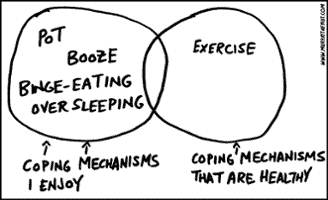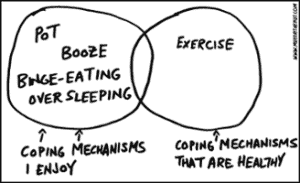
 Does Your Method of Coping Really Work?
Does Your Method of Coping Really Work?
Everyone I know uses some method to cope with stress. Our bodies always want to be in homeostasis, that perfect sort of balance of its systems. However, when life is stressful, and for many people it is constantly stressful, we must manage our stress by surviving another day on the planet.
Many of us were stressed even as children. We lived in an adult world where rules changed, expectations weren’t clear or were crazy. Adults took care of themselves in destructive ways and we learned very early to find coping mechanisms for our stress. Perhaps there wasn’t even an outward identifiable problem from a child’s perspective, but you knew something wasn’t right, you knew something about your home was different from the other families.
Since I know most of us are not meditating enough, our survival mechanisms often include food, dieting or working obsessively, screens/computers, phones and television. I know many people who compulsively exercise; Alcohol and dare I say it, Marijuana. I even know someone who obsessively cleans her house and then eats a pint of ice cream.
Many of these coping mechanisms are considered socially acceptable. And we admire the individual’s tenacity as if they are super human and someone to be admired. As if someone who diets obsessively is superior to the rest of us. It’s not to be admired. It’s to understand that everyone suffers. Everyone. And when we do anything out of balance, we must give up something else. Always. Because there are only 24 hours in a day for any of us.
Did anyone ever get to old age and think, “I didn’t work enough? “I didn’t look at my phone enough?” “I should have dieted more!” “I should have spent less time with my children!”
So when we judge ourselves for using something such as food to cope, then we might begin the work of unraveling how we came to use food as a coping mechanism and how we slowly discover in a healthy way, how to let go of using food.
What would happen if you didn’t use food (or any other negative device) as a coping strategy? Think about it for a moment. Some of you might be saying:
I would die.
I wouldn’t know what to do.
I wouldn’t know who I was.
I wouldn’t even want to try.
I wouldn’t even want to know.
The idea of changing this use of our device can just magnify the stress in our already stressful lives. Why would we change? Because eventually, the “bill” must be paid. Either in health, lost opportunity or relationships. Because these devices have always only offered temporary immediate gratification, but they have never offered true peace.
And I’m not suggesting you give up everything. This is critical. You can’t simply give up things. This increases your stress. You must find strategies of replacing the behavior with strategies that do work. You must trade a negative coping strategy for one or more positive strategies.
The new strategies won’t feel as good as your current choice. They aren’t familiar, they aren’t habitual, they aren’t the same to your body, yet. You have to give yourself time to explore new strategies and get your brain used to responding to lowering your stress in these new ways. For awhile they may only feel “good enough.” Not the same degree of satisfaction, but they’ll do. And that’s okay. Give yourself the adjustment period.
Ideas for coping?
Anything in moderation. Even some of the previous mentioned things. However, ask yourself if you’re doing your coping strategies to the exclusion of other behaviors? Are you exercising to the exclusion of sleep? Are you watching television to the exclusion of exercise? Are you cleaning house to the exclusion of taking time with your family? Are you working to the exclusion of taking time to read or listen to music?
We simply can’t have it all but we can have many things. And you have to figure out how to spend time with more activities that make you happy and less devices that simply allow you to get by. Getting by isn’t a quality life. It’s a survival mechanism. And hooray, you’re surviving, but how about wanting more for your life than survival?


Great article, Amy. Really spoke to me and forces me to confront the feelings I’m trying to block with that next bite of food. Thank you so much for your wise words!
Amy, you’ve outlined a practical approach to a less-stressful life: choose more productive coping mechanisms. While that process may itself be stressful, the cost/benefit analysis for what a person is currently doing to cope will reveal how effective the new strategies will be in the long run. I think what yore saying is that we need to plan how to move from short-term gratification to long haul success in order to REALLY reduce stress. Thanks for this illuminating piece.